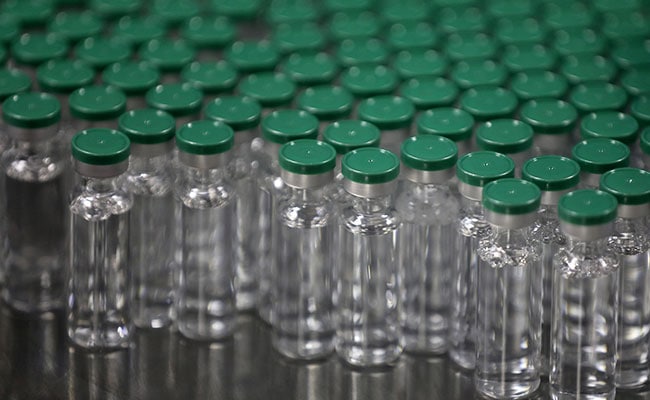The Covishield vaccine was developed by AstraZeneca-Oxford University (File)
The gap between the first and second doses of the Covishield COVID-19 vaccine has been increased to 12-16 weeks - from the existing six-eight weeks - the government said Thursday. No changes have been announced in dosage intervals for Covaxin, which remains at four to six weeks.
"Based on available real-life evidence, particularly from the United Kingdom, the COVID-19 Working Group has agreed to increase dosing interval between two doses of Covishield to 12-16 weeks. No change in intervals for Covaxin was recommended," the government said in its statement.
The changes were accepted Wednesday by the National Expert Group on Vaccine Administration, which is led by NITI Aayog member Dr VK Paul, and by the Union Health Ministry this evening.
At a ministry briefing Dr Paul said the extension had been recommended "after careful study and without pressure from anyone", and that the World Health Organization had been consulted.
Adar Poonawalla, whose Serum Institute manufactures Covishield, told NDTV: "This is beneficial both from efficacy and immunogenicity standpoint... good scientific decision to increase the gap."
This is the second time in three months Covishield dosage intervals have been widened; in March states and UTs were told to increase the gap from 28 days to six-eight weeks "for better results".
Widening of Covishield dosage intervals has been linked to increased efficacy.
A study published in international medical journal The Lancet on February 19 claimed a 26.2 per cent increase - from 55.1 per cent to 81.3 per cent - if doses were spaced 12 or more weeks apart.

The SII, which manufactures the vaccine in India, said it would increase production by August (File)
However, the changes come amid an acute shortage of doses as the Serum Institute struggles to match demand. The shortfall has forced some states to halt vaccination for the 18-44 age group.
The timing of these recommendations have sparked suggestions the government is trying to eke out current stocks and give as many people as possible at least one dose till supply can be replenished.
The Congress' Jairam Ramesh tweeted: "First, it was four weeks for the second dose, then six-eight weeks and now we are told 12-16 weeks. Is this because there are not enough stocks of vaccines... or because professional scientific advice says so?"
"Can we expect some transparency from the Modi government?" he added.
First, it was 4 weeks for the 2nd dose, then 6-8 weeks and now we are told 12-16 weeks. Is this because there are not enough stocks of the vaccines for all who are eligible or because professional scientific advice says so? Can we expect some transparency from the Modi Govt? pic.twitter.com/DJy31KEA0a
— Jairam Ramesh (@Jairam_Ramesh) May 13, 2021
Dr CN Ashwathnarayan, the Deputy Chief Minister of Karnataka - one of several states to flag low vaccine stocks - later tweeted, although not as a direct reply to Mr Ramesh: "Extending the gap assists the government in carrying out the inoculation programme effectively".
"Many countries follow this practice. In Canada the gap is three-four months. In the meantime, we are making all efforts to increase supply and explore local production options," he said.
Earlier today SII officials told the government Covishield production will be increased to 10 crore doses - but only from August - and that June-July production "may also increase by some quantity".
India is struggling to contain a devastating second wave of COVID-19 infections and deaths, with daily numbers now over three lakh for more than 21 consecutive days. The flood of cases has brought the country's healthcare system to its knees, and stressed the need for rapid vaccination.
The national vaccination drive began on January 16 and over 17.7 crore doses have been administered so far, but full vaccine coverage is still less than 2.5 per cent of the population.
Several states, including national capital Delhi and Maharashtra, Kerala and Karnataka, have floated global tenders for direct import of vaccines till domestic supply stabilises.
Track Latest News Live on NDTV.com and get news updates from India and around the world

